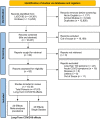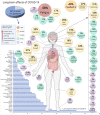More than 50 long-term effects of COVID-19: a systematic review and meta-analysis - PubMed (original) (raw)
Meta-Analysis
More than 50 long-term effects of COVID-19: a systematic review and meta-analysis
Sandra Lopez-Leon et al. Sci Rep. 2021.
Abstract
COVID-19 can involve persistence, sequelae, and other medical complications that last weeks to months after initial recovery. This systematic review and meta-analysis aims to identify studies assessing the long-term effects of COVID-19. LitCOVID and Embase were searched to identify articles with original data published before the 1st of January 2021, with a minimum of 100 patients. For effects reported in two or more studies, meta-analyses using a random-effects model were performed using the MetaXL software to estimate the pooled prevalence with 95% CI. PRISMA guidelines were followed. A total of 18,251 publications were identified, of which 15 met the inclusion criteria. The prevalence of 55 long-term effects was estimated, 21 meta-analyses were performed, and 47,910 patients were included (age 17-87 years). The included studies defined long-COVID as ranging from 14 to 110 days post-viral infection. It was estimated that 80% of the infected patients with SARS-CoV-2 developed one or more long-term symptoms. The five most common symptoms were fatigue (58%), headache (44%), attention disorder (27%), hair loss (25%), and dyspnea (24%). Multi-disciplinary teams are crucial to developing preventive measures, rehabilitation techniques, and clinical management strategies with whole-patient perspectives designed to address long COVID-19 care.
© 2021. The Author(s).
Conflict of interest statement
The authors are solely responsible for all content, and funders played no role in study design, data collection, and analysis, the decision to publish, or preparation of the manuscript. S.L.L. is an employee of Novartis Pharmaceutical Company; the statements presented in the paper do not necessarily represent the position of the company. The remaining authors have no competing interests to declare.
Figures
Figure 1
Study selection. Preferred items for Systematic Reviews and Meta-Analyses (PRISMA) flow diagram. Out of 15,917 identified studies and after application of the inclusion and exclusion criteria, 15 studies were included in the quantitative synthesis.
Figure 2
Long-term effects of coronavirus disease 2019 (COVID-19). The meta-analysis of the studies included an estimate for one symptom or more reported that 80% of the patients with COVID-19 have long-term symptoms. CRP C-reactive protein, CT computed tomography, IL-6 Interleukin-6, NT-proBNP (NT)-pro hormone BNP, OCD Obsessive Compulsive Disorder, PTSD Post-traumatic stress disorder. This figure was created using Biorender.com.
Update of
- More than 50 Long-term effects of COVID-19: a systematic review and meta-analysis.
Lopez-Leon S, Wegman-Ostrosky T, Perelman C, Sepulveda R, Rebolledo PA, Cuapio A, Villapol S. Lopez-Leon S, et al. medRxiv [Preprint]. 2021 Jan 30:2021.01.27.21250617. doi: 10.1101/2021.01.27.21250617. medRxiv. 2021. PMID: 33532785 Free PMC article. Updated. Preprint. - More Than 50 Long-Term Effects of COVID-19: A Systematic Review and Meta-Analysis.
Lopez-Leon S, Wegman-Ostrosky T, Perelman C, Sepulveda R, Rebolledo P, Cuapio A, Villapol S. Lopez-Leon S, et al. Res Sq [Preprint]. 2021 Mar 1:rs.3.rs-266574. doi: 10.21203/rs.3.rs-266574/v1. Res Sq. 2021. PMID: 33688642 Free PMC article. Updated. Preprint.
Comment in
- 80% of patients with COVID-19 have ≥1 long-term effect at 14 to 110 d after initial symptoms.
Kaczynski M, Mylonakis E. Kaczynski M, et al. Ann Intern Med. 2022 Jan;175(1):JC10. doi: 10.7326/J21-0007. Epub 2022 Jan 4. Ann Intern Med. 2022. PMID: 34978852
Similar articles
- More Than 50 Long-Term Effects of COVID-19: A Systematic Review and Meta-Analysis.
Lopez-Leon S, Wegman-Ostrosky T, Perelman C, Sepulveda R, Rebolledo P, Cuapio A, Villapol S. Lopez-Leon S, et al. Res Sq [Preprint]. 2021 Mar 1:rs.3.rs-266574. doi: 10.21203/rs.3.rs-266574/v1. Res Sq. 2021. PMID: 33688642 Free PMC article. Updated. Preprint. - More than 50 Long-term effects of COVID-19: a systematic review and meta-analysis.
Lopez-Leon S, Wegman-Ostrosky T, Perelman C, Sepulveda R, Rebolledo PA, Cuapio A, Villapol S. Lopez-Leon S, et al. medRxiv [Preprint]. 2021 Jan 30:2021.01.27.21250617. doi: 10.1101/2021.01.27.21250617. medRxiv. 2021. PMID: 33532785 Free PMC article. Updated. Preprint. - Long-COVID in children and adolescents: a systematic review and meta-analyses.
Lopez-Leon S, Wegman-Ostrosky T, Ayuzo Del Valle NC, Perelman C, Sepulveda R, Rebolledo PA, Cuapio A, Villapol S. Lopez-Leon S, et al. Sci Rep. 2022 Jun 23;12(1):9950. doi: 10.1038/s41598-022-13495-5. Sci Rep. 2022. PMID: 35739136 Free PMC article. - Long-Term Neurological Sequelae Among Severe COVID-19 Patients: A Systematic Review and Meta-Analysis.
Patel UK, Mehta N, Patel A, Patel N, Ortiz JF, Khurana M, Urhoghide E, Parulekar A, Bhriguvanshi A, Patel N, Mistry AM, Patel R, Arumaithurai K, Shah S. Patel UK, et al. Cureus. 2022 Sep 28;14(9):e29694. doi: 10.7759/cureus.29694. eCollection 2022 Sep. Cureus. 2022. PMID: 36321004 Free PMC article. Review. - Persistent symptoms among post-COVID-19 survivors: A systematic review and meta-analysis.
Rochmawati E, Iskandar AC, Kamilah F. Rochmawati E, et al. J Clin Nurs. 2024 Jan;33(1):29-39. doi: 10.1111/jocn.16471. Epub 2022 Nov 25. J Clin Nurs. 2024. PMID: 36426658 Review.
Cited by
- Covid Induced Telogen Effluvium (CITE): An Insight.
Inamadar AC. Inamadar AC. Indian Dermatol Online J. 2022 Jun 24;13(4):445-448. doi: 10.4103/idoj.idoj_139_22. eCollection 2022 Jul-Aug. Indian Dermatol Online J. 2022. PMID: 36262583 Free PMC article. Review. - Post-COVID-19 Syndrome is Rarely Associated with Damage of the Nervous System: Findings from a Prospective Observational Cohort Study in 171 Patients.
Fleischer M, Szepanowski F, Tovar M, Herchert K, Dinse H, Schweda A, Mausberg AK, Holle-Lee D, Köhrmann M, Stögbauer J, Jokisch D, Jokisch M, Deuschl C, Skoda EM, Teufel M, Stettner M, Kleinschnitz C. Fleischer M, et al. Neurol Ther. 2022 Dec;11(4):1637-1657. doi: 10.1007/s40120-022-00395-z. Epub 2022 Aug 26. Neurol Ther. 2022. PMID: 36028604 Free PMC article. - National long COVID impact and risk factors.
Baruch J, Zahra C, Cardona T, Melillo T. Baruch J, et al. Public Health. 2022 Dec;213:177-180. doi: 10.1016/j.puhe.2022.09.021. Epub 2022 Nov 23. Public Health. 2022. PMID: 36434908 Free PMC article. - Prevalence, risk factors and treatments for post-COVID-19 breathlessness: a systematic review and meta-analysis.
Zheng B, Daines L, Han Q, Hurst JR, Pfeffer P, Shankar-Hari M, Elneima O, Walker S, Brown JS, Siddiqui S, Quint JK, Brightling CE, Evans RA, Wain LV, Heaney LG, Sheikh A. Zheng B, et al. Eur Respir Rev. 2022 Nov 2;31(166):220071. doi: 10.1183/16000617.0071-2022. Print 2022 Dec 31. Eur Respir Rev. 2022. PMID: 36323418 Free PMC article. Review. - Neurocognitive and Neuropsychiatric Sequelae in Long COVID-19 Infection.
Almeria M, Cejudo JC, Deus J, Krupinski J. Almeria M, et al. Brain Sci. 2024 Jun 14;14(6):604. doi: 10.3390/brainsci14060604. Brain Sci. 2024. PMID: 38928604 Free PMC article.
References
- Ritchie, H., Ortiz-Ospina, E., Beltekian, D., Mathieu, E., Hasell, J., Macdonald, B., Giattino, C., Appel, C., Rodés-Guirao, L., & Roser, M. Coronavirus Pandemic (COVID-19). (2021).
Publication types
MeSH terms
LinkOut - more resources
Full Text Sources
Other Literature Sources
Medical
Miscellaneous

